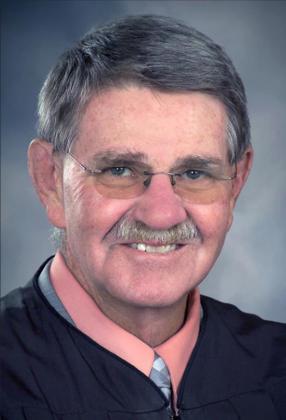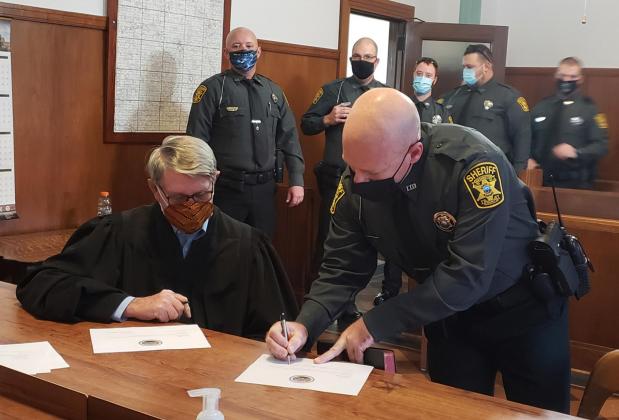Judge Paul Monty said he has joked for many years that he would practice law for 50 years. The bar association used to give a 50-year pin, and he wanted it. Now, after 52 years, he is retiring, saying he wasn’t ready to retire until this past year when COVID-19 changed the way he gets to interact with people.
He was an attorney in Washington for more than 38 years before being appointed to Judge Terry Taylor’s District Magistrate Judge position for the 12 th Judicial District in February 2007 and serving 14 years in that capacity.
While COVID-19 ultimately readied Judge Monty for retirement, state law prevented him from seeking retention as the age limit for judges seeking another term is 75. Judge Monty turns 77 this month.
Retirement will bring more time for the avid reader to find new books and play golf. He said he also plans to be in his 4,000-square-foot garden “from spring until fall.”
Unexpected career
Judge Monty grew up on a farm in Cloud County and went to Fort Hays State University majoring in political science with the thought of becoming a teacher. One of his teachers was an attorney, he said, and helped inspire him to pursue a career in law.
Judge Monty went to law school at KU before beginning private practice in Washington on July 1, 1969. It was a family connection that brought him to Washington. A relative of his was married to Mary Alice Pacey, whose father was Washington attorney Ferrel Lobaugh.
Judy Monty began his career practicing on his own, though he had partners through the years including Tom Kier, Murray Anderson and John Eyer. His secretaries have included Cheryl Kinzie, Shirley Marrs, Myrna Willbrant and Gayle Monty. His offices have been in the basement of the United Bank building, Derek Bruna’s tax and accounting office, and the old Ford garage.
He said the worst cases he had over the years were cases involving farmers who were losing their land in the 1980s.
“I like trying to help people with their problems,” he said. “The vast majority of my clients are very nice people.”
The clients were Judge Monty’s favorite part of his career, and it’s why he never left Washington in search of something greener. He had some of his longest clients for 35 years, he said.
“When you practice like I did, you are able to know and become friends with clients,” he said. “I never ever thought you had that in the city.”
Judge Monty said there were times when he had to work nights or weekends to get things done, but “he always attempted to have reasonable hours.”
“Seventy-hour weeks were not for me,” he said.
He did do city attorney work for local communities including Clifton, Linn, Barnes and Haddam, and he was the city attorney for Washington for 30 or 40 years, he said.
He said he enjoyed all types of cases, though in his last years in private practice he concentrated on wills, trusts and business planning. He and John Eyer had an abstract company.
“Me and John went together because it was nice to have someone to help you get ready for trials and talk about the law with,” he said.
After Eyer left to become a judge in Republic County, Judge Monty said he was getting tired of practicing alone. It was at about that time that Judge Kim Cudney talked him into applying for Judge Terry Taylor’s seat.
Judge Monty said his wife, Gayle, who was his secretary since 1980, was also leaving at that time to become Judge Cudney’s assistant.
Judge Monty
Being a judge “is harder than you think” after 40 years of focusing on one side of a case, Judge Monty said.
“Instead of being the best advocate you can be for one side, you have to be the most fair and neutral for both sides,” he said. “You want people to think they received a fair hearing.”
During his years as a judge, he said he has strived to treat people fairly and with respect.
“Even when ruling against someone, you have to treat them with dignity and help make them see they had a fair hearing,” he said.
He is most satisfied, he said, when he can help people resolve the problems that brought them to his court.
Monty said he also has worked to promote the importance of the judiciary.
“In my view, it is the most important branch of government, because without the judiciary, you don’t have government for the people,” he said. “A close friend from Africa told me his country had as fine a constitution as the United States, but no one enforced it.”
Judge Monty said he “is not a big believer that punishment deters crime.”
“I’m always hopeful they will make a change,” he said of some defendants who have come to his courtroom. “But I’m realistic.”
He said he doesn’t get mad at repeat offenders, but he is stern.
“I’ve told defendants before, ‘This is the third time I’ve had you here,’” he said.
Judge Monty primarily conducted settlement conferences in civil and domestic cases, though he also handled criminal and traffic cases, limited actions and some domestic relations and juvenile offender/child in need of care cases.
Judge Monty said he has done many settlement conferences around the district – the district includes the counties of Lincoln, Mitchell, Jewell, Cloud, Republic and Washington. He said he traveled around the district and was doing 2-to-3 settlement conferences a week and filling in for other judges before COVID-19. Since then he has worked almost exclusively from Washington with all court matters being done virtually.
“I miss seeing the people,” he said.
His final day was Monday, Jan. 11, where he administered the oath to newly elected county officials, signed some paperwork and cleaned out his office.



